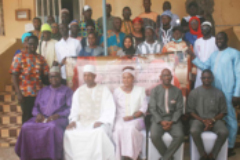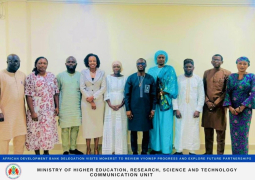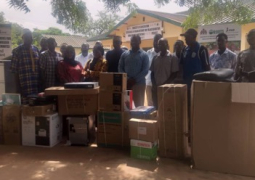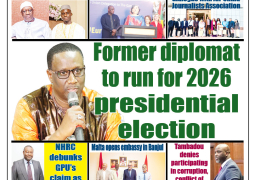
The about to start project is meant to build national capacities in the identification and safeguarding of ICH and to raise awareness among the general public on the importance of heritage and its social value.
It will also assist The Gambian communities in completing the first national inventory of Intangible Cultural Heritage (ICH).
Launching the project at the event held at the National Centre for Arts and Culture premises in Banjul, the minister of Tourism and Culture, Hamat N.K. Bah, disclosed that the project was funded by UNESCO and would be executed by NCAC and UNESCO Dakar Regional Office with support from Living Heritage experts from the UNESCO ICH network of experts.
Minister Bah explained that the project has been long in the making, saying the collaboration started as far back as early 2021 when the UNESCO Office in Dakar started working with the NCAC to design it “over a period of close to 16 months.”
And “it was finally approved in February and the implementing partnership agreement signed between the UNESCO and NCAC for it to begin in earnest as UNESCO has earmarked US$50,590.00 for the entire project for the NCAC segment,” he added.
The project, he noted, has a national coverage which is why “we have experts in ICH from all the seven regions, all ethnic groups and languages and religions, including a fair representation of women.”
According to the minister Bah, the ICH elements that shall be most valuable to the inventory are those that have a strong practical value and can contribute to sustainable management of natural resources, or disaster risk reduction or the prevention of violent extremism.
The information, Minister Bah said, would be published into a document called Inventory of Gambian Intangible Cultural Heritage (ICH) which will help The Gambia in its development planning process, especially as it concerns the heritage and tourism sectors.
“The new Tourism Policy and Strategy and the new National Arts and Culture Policy, have mentioned the need for a national inventory of tangible and intangible heritage to enable the sectors know what is there to be valorised to provide new tourism products, and contribute to the strengthening of our national identity as Gambians,” he posited.
The government has also supported institutional and legal framework for the culture and arts sector he said.
He, therefore, thanked UNESCO for being their steadfast and trusted partner in the development of the cultural sectors in the country.
Delivering a speech at the launching, Seraphine Wakana, United Nations Resident Coordinator in The Gambia, attested that The Gambia has a deep and incredibly rich history, dating back from proto historical times, as well as a very rich heritage.
“The Stone Circles of the Senegambia, one of The Gambia’s World Heritage sites, represent an extraordinary concentration over 1,000 along the River Gambia, dating back from between 3rd and 16th century. They bear witness of the highly sophisticated social organisations that settled in The Gambia in the past and the enormous rich history this country has,” she explained.
The UN Resident Coordinator said, government of The Gambia has placed culture at the heart of the Gambia NDP (2018-2021) and is developing public policies in line with this such as the recent Tourism Policy and Strategy (2022-2032) and National Arts and Culture Policy (2019-2029), which establishes a link between the country’s development and the protection, safeguarding and promotion of both tangible and intangible heritage.
Mr. Dimitri Sanga, Director of the UNESCO Multi-Sectoral Regional Officer for West Africa, Sahel vis virtual means made some remarks about the project, while Hassoum Ceesay, the director general of NCAC gave a detailed background of the project.





